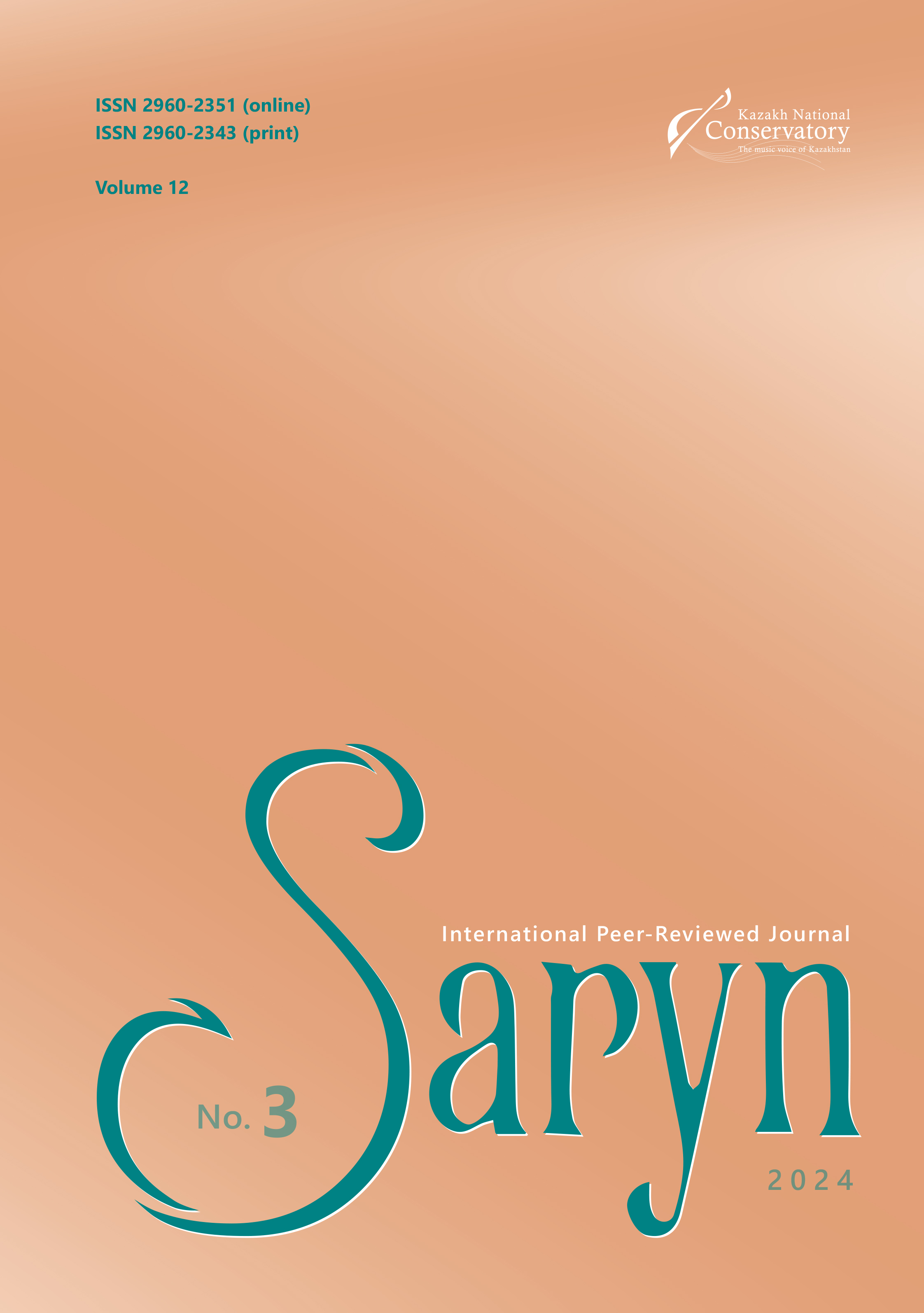Article information
Article publication date
2024-09-23
Article Page
95–111
Chapter
Arts & Humanities
License
Abstract
The article investigates the evolution of documentary cinematography of Kazakhstan during the period of independence through the prism of films by Vladimir Tyulkin. The work analyzes how the reflection of the country’s socio-cultural changes expresses itself through the documentary films, revealing the connection between the director’s personal interpretation and historical transformations.
The use of Eduard Dubrovskiy’s methodology such as “problem statement”, “hero reflecting the essence of the problem”, “primary dramatic situation” and “method of embodiment” allows us to identify the main dramaturgical categories in Tyulkin’s films, as well as to explore how the director builds a dialog with the audience, unfolding social and historical narratives. The documentary films chosen for art historical analysis are: Lord of the Flies (1991), It’s not about Dogs (2010), and 13 Kilometers (2018). These films have not yet received a sufficiently deep and comprehensive analysis in academic literature. They show various aspects of Kazakhstan’s reality, including political changes, social challenges and personal stories of ordinary people influenced by big historical processes. The analysis focuses on the visual and narrative strategies that the filmmaker uses to create a powerful emotional impact and a deep understanding of the events context.
The novelty of the study lies in the exploration of these three works that reveal the author’s concept of directing, aimed to the psychological review of a human being and his interaction with the surrounding world. It opens new horizons for understanding the interaction of cinema with the socio-cultural context.
Keywords
documentary cinematography of Kazakhstan
Vladimir Tyulkin
documentary film
visual and narrative strategies
concept of directing
interaction of cinema
References
Абикеева, Гульнара. «Реконструкция памяти, или Новые темы в казахском кино». Saryn, т. 11, № 3, 2023, с. 63–75. DOI: 10.59850/SARYN.2.11.2023.14.
Дубровский, Эдуард. Остановись, мгновение! Очерки драматургии неигрового фильма. Москва, Искусство, 1982, 152 с.
Евтеева, Ирина. Кинодраматургия и строение фильма: учебное пособие. Санкт-Петербург, Лань: Планета музыки, 2020, 292 с.
Матизен, Виктор. «Собачья жизнь в отсутствие Якопетти. “Се – человек”, режиссер Владимир Тюлькин». Искусство кино, № 4, апрель, 1999, www.old.kinoart.ru/archive/1999/04/n4-article6. Дата доступа 13 мая 2024.
Мукушева, Назира. «Отражение исторического времени в казахском документальном кино». Этническая культура, т. 4, № 2, 2022, с. 17–20. DOI: 10.31483/r-101536.
Commoli, Jean-Louis. “Technique and Ideology: Camera, Perspective, Depth of Field.” Narrative, Apparatus, Ideology: A Film Theory Reader, ed. Philip Rosen, Columbia University Press, 1986, pp. 421–443.
Daminov, Ildar. “Reassessing Classification of Kazakhstan’s Ethnic Management Model: A Comparative Approach.” Journal of Eurasian Studies, vol. 11, no. 2, 2020, pp. 133–143. DOI: 10.1177/1879366520925337.
Sarris, Andrew. The Primal Screen. Essays on Film and Related Subjects. New York, Simon and Schuster, 1973, pp. 38–53.
Zimbardo, Philip George. The Lucifer Effect: Understanding How Good People Turn Evil. New York, Random House, 2007, p. 576.
Abikeyeva, Gulnara. “Reconstruction of Memory, or New Themes in Kazakh Cinema.” Saryn, vol. 11, no. 3, 2023, pp. 63–75. DOI: 10.59850/SARYN.2.11.2023.14. (In Russian)
Commoli, Jean-Louis. “Technique and Ideology: Camera, Perspective, Depth of Field.” Narrative, Apparatus, Ideology: A Film Theory Reader, ed. Philip Rosen, Columbia University Press, 1986, pp. 421–443.
Daminov, Ildar. “Reassessing Classification of Kazakhstan’s Ethnic Management Model: A Comparative Approach.” Journal of Eurasian Studies, vol. 11, no. 2, 2020, pp. 133–143. DOI: 10.1177/1879366520925337.
Dubrovskiy, Eduard. Ostanovis, mgnovenje: Ocherki dramaturgii neigrovogo filma [Stop, Moment: Essays on the Dramaturgy of Non-fiction Films]. Moscow, Iskusstvo, 1982. (In Russian)
Yevteyeva, Irina. Kinodramaturgiya i stroenie filma: uchebnoe posobie [Film Dramaturgy and Structure: Textbook]. St. Petersburg, Lan, Planeta muzyki, 2020. (In Russian)
Matizen, Viktor. “Sobachya zhizn v otsutstvii Yakopetti. ‘Se – chelovek’, rezhisser Vladimir Tyulkin.” [“Dog’s Life in the Absence of Jacopetti. ‘This is a Man’, directed by Vladimir Tyulkin.”] Iskusstvo kino, April 1998, http://old.kinoart.ru/archive/1999/04/n4-article6. Accessed 13 May 2024. (In Russian)
Mukusheva, Nazira. “Otrazhenie istoricheskogo vremeni v kazakhskom dokumentalnom kino.” [“Reflection of Historical Time in Kazakh Documentary Cinema.”] Etnicheskaya kultura, vol. 4, no. 2, 2022, pp. 17–20. DOI: 10.31483/r-101536. (In Russian)
Sarris, Andrew. The Primal Screen. Essays on Film and Related Subjects. New York, Simon and Schuster, 1973, pp. 38–53.
Zimbardo, Philip George. The Lucifer Effect: Understanding How Good People Turn Evil. New York, Random House, 2007, p. 576.




